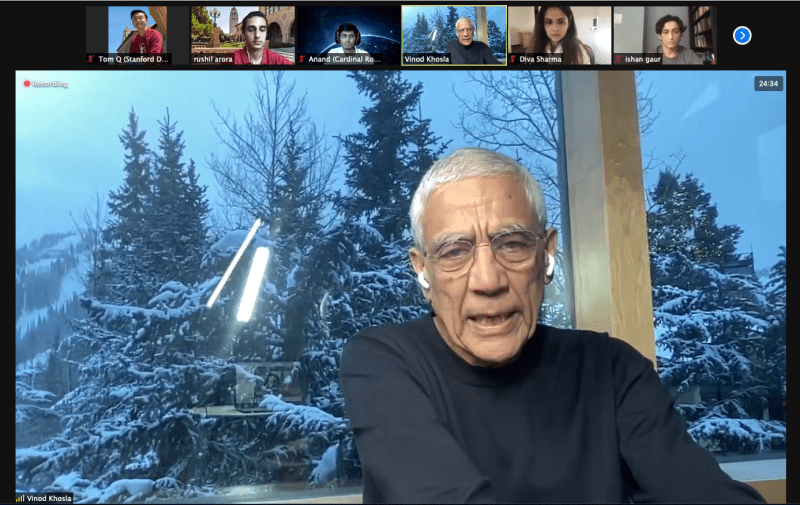Vinod Khosla MBA ’80 of Khosla Ventures urged student-entrepreneurs to avoid constraining themselves with too many rules and to accept “brutal honesty over hypocritical politeness” during a fireside chat with ASES on Wednesday. The event also offered multiple student startups the opportunity to make two-minute pitches to Khosla and hear his advice for their companies’ future growth.
Khosla’s keys to success
Khosla told creators they needed an open mind and willingness to grow, two qualities that are “by far the single largest factor” in accomplishing anything extraordinary. He added that discovering a rich, specific niche is more critical than landing on a large market, and “there is no part of the GDP that is not subject to radical innovation.”
Additionally, he said critiques are “way more valuable than the people who say, ‘You are doing a great job! This is a great idea!'” Khosla advised attendees to search for people that warn of possible failure in order to preemptively engineer around those hurdles before they arise.
Although there are many types of startup leaders, Khosla said he is committed to working with ambitious founders who “imagine the possible and then no matter how difficult, try to make it happen.” He summarized this risk-taking attitude, saying “if there is 90% of failing, that’s ok, as long as there is a 10% chance of changing the world.”
Responding to a question about building a startup, Khosla focused on the importance of compatibility, not only when finding investors but also when creating a team from the ground up.
He also recommended that student startup leaders “pick the team that minimizes the risks and maximizes the diversity of experiences.” Thinking back to when he first graduated business school, he said that young founders should feel “liberated” about not having to worry about failure, as they have considerably less liabilities compared to older adults.
Nearing the end of the talk, the event’s moderator Rushil Arora ’23 asked Khosla for guidance on approaching college years and how being a current student affects those venturing into the startup world.
“Most of business is common,” Khosla said. “You don’t need an MBA. The more diverse the education is across all areas, the more likely you can think laterally and broadly.”
Student startups pitch to Khosla
Following the event, four startups pitched their businesses to Khosla.
Among those was Cardinal Robotics, a company which supplies Ultraviolet-C (UV-C) disinfecting robots to nationwide community retailers such as Target. The founding team first met back in 2018 after taking EE 205: Product Management for Electrical Engineers and Computer Scientists and began working on Cardinal Robotics in May 2020.
The founders say their efficient “human-focused” machinery aims to be an alternative to traditional disinfectants popularized by the pandemic. CTO Anand Lalwani called these sanitizers “incredibly harmful.” Their equipment shields humans from exposure while releasing targeted UV-C lights that, according to the FDA, can “destroy” and “inactivate” viruses in the air, water and other solid surfaces.
Lalwani, a third-year electrical engineering Ph.D. candidate, explained that once the device undergoes a trial and approval process, Cardinal Robotics plans to have its device in over 1,800 Target stores.
Khosla discouraged the company from immediately relying too heavily on large corporations such as hospitals and retailers. Rather, Cardinal Robotics should build a solid foundation independently and control their price points prior to corporate partnerships. However, he believed in the idea, adding that “robotics will get dramatically better because of AI for the next three to five years.”
“This was 100% useful and it’s great to know that this is a space we should be in,” Lalwani said after the pitch, mentioning that while most people cannot dissect a startup’s potential in under two minutes, Khosla actually gives useful feedback.
The team behind Omniscient Labs also took the opportunity to present their company, which concentrates on “building backend object detection and classification tools for the military.” Since its founding in October 2020, Omniscient Labs has been awarded a $50,000 contract with the U.S. Space Force according to CEO Nick Mirda, MBA ’21, who said the company is looking to further develop their models by working with the Department of Defense to access government and private investments.
Mirda said that his COO Andrew Fang ’22 and the rest of the company plan on expanding operational testing on their products this summer, so pitching during this event felt like the perfect opportunity.
Echoing appreciation for Khosla’s feedback, Fang said the team found inspiration when Khosla suggested that Omniscient Labs could “surf the wave” of both computer vision innovation and changes within the defense industry. While Fang said this sector has largely been closed off to independent startups, he noted that “there is now an opening for technology startups to engage with government.”
Khosla offered a final reminder that budding entrepreneurs often restrict their full potential by not imagining and exploring creativity.
“Most people I run into are not limited by what they can do, they are almost always limited by what they think they can do,” Khosla said. “Invent the future you want to happen.”
Contact Tom Quach at tomquach ‘at’ stanford.edu.
